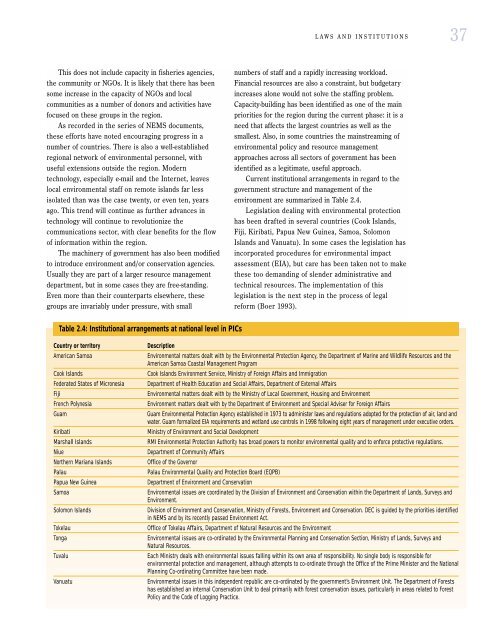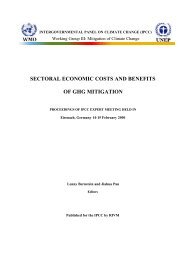Pacific Islands Environment Outlook - UNEP
Pacific Islands Environment Outlook - UNEP
Pacific Islands Environment Outlook - UNEP
Create successful ePaper yourself
Turn your PDF publications into a flip-book with our unique Google optimized e-Paper software.
LAWS AND INSTITUTIONS 37<br />
This does not include capacity in fisheries agencies,<br />
the community or NGOs. It is likely that there has been<br />
some increase in the capacity of NGOs and local<br />
communities as a number of donors and activities have<br />
focused on these groups in the region.<br />
As recorded in the series of NEMS documents,<br />
these efforts have noted encouraging progress in a<br />
number of countries. There is also a well-established<br />
regional network of environmental personnel, with<br />
useful extensions outside the region. Modern<br />
technology, especially e-mail and the Internet, leaves<br />
local environmental staff on remote islands far less<br />
isolated than was the case twenty, or even ten, years<br />
ago. This trend will continue as further advances in<br />
technology will continue to revolutionize the<br />
communications sector, with clear benefits for the flow<br />
of information within the region.<br />
The machinery of government has also been modified<br />
to introduce environment and/or conservation agencies.<br />
Usually they are part of a larger resource management<br />
department, but in some cases they are free-standing.<br />
Even more than their counterparts elsewhere, these<br />
groups are invariably under pressure, with small<br />
numbers of staff and a rapidly increasing workload.<br />
Financial resources are also a constraint, but budgetary<br />
increases alone would not solve the staffing problem.<br />
Capacity-building has been identified as one of the main<br />
priorities for the region during the current phase: it is a<br />
need that affects the largest countries as well as the<br />
smallest. Also, in some countries the mainstreaming of<br />
environmental policy and resource management<br />
approaches across all sectors of government has been<br />
identified as a legitimate, useful approach.<br />
Current institutional arrangements in regard to the<br />
government structure and management of the<br />
environment are summarized in Table 2.4.<br />
Legislation dealing with environmental protection<br />
has been drafted in several countries (Cook <strong>Islands</strong>,<br />
Fiji, Kiribati, Papua New Guinea, Samoa, Solomon<br />
<strong>Islands</strong> and Vanuatu). In some cases the legislation has<br />
incorporated procedures for environmental impact<br />
assessment (EIA), but care has been taken not to make<br />
these too demanding of slender administrative and<br />
technical resources. The implementation of this<br />
legislation is the next step in the process of legal<br />
reform (Boer 1993).<br />
Table 2.4: Institutional arrangements at national level in PICs<br />
Country or territory<br />
American Samoa<br />
Cook <strong>Islands</strong><br />
Federated States of Micronesia<br />
Fiji<br />
French Polynesia<br />
Guam<br />
Kiribati<br />
Marshall <strong>Islands</strong><br />
Niue<br />
Northern Mariana <strong>Islands</strong><br />
Palau<br />
Papua New Guinea<br />
Samoa<br />
Solomon <strong>Islands</strong><br />
Tokelau<br />
Tonga<br />
Tuvalu<br />
Vanuatu<br />
Description<br />
<strong>Environment</strong>al matters dealt with by the <strong>Environment</strong>al Protection Agency, the Department of Marine and Wildlife Resources and the<br />
American Samoa Coastal Management Program<br />
Cook <strong>Islands</strong> <strong>Environment</strong> Service, Ministry of Foreign Affairs and Immigration<br />
Department of Health Education and Social Affairs, Department of External Affairs<br />
<strong>Environment</strong>al matters dealt with by the Ministry of Local Government, Housing and <strong>Environment</strong><br />
<strong>Environment</strong> matters dealt with by the Department of <strong>Environment</strong> and Special Adviser for Foreign Affairs<br />
Guam <strong>Environment</strong>al Protection Agency established in 1973 to administer laws and regulations adopted for the protection of air, land and<br />
water. Guam formalized EIA requirements and wetland use controls in 1998 following eight years of management under executive orders.<br />
Ministry of <strong>Environment</strong> and Social Development<br />
RMI <strong>Environment</strong>al Protection Authority has broad powers to monitor environmental quality and to enforce protective regulations.<br />
Department of Community Affairs<br />
Office of the Governor<br />
Palau <strong>Environment</strong>al Quality and Protection Board (EQPB)<br />
Department of <strong>Environment</strong> and Conservation<br />
<strong>Environment</strong>al issues are coordinated by the Division of <strong>Environment</strong> and Conservation within the Department of Lands, Surveys and<br />
<strong>Environment</strong>.<br />
Division of <strong>Environment</strong> and Conservation, Ministry of Forests, <strong>Environment</strong> and Conservation. DEC is guided by the priorities identified<br />
in NEMS and by its recently passed <strong>Environment</strong> Act.<br />
Office of Tokelau Affairs, Department of Natural Resources and the <strong>Environment</strong><br />
<strong>Environment</strong>al issues are co-ordinated by the <strong>Environment</strong>al Planning and Conservation Section, Ministry of Lands, Surveys and<br />
Natural Resources.<br />
Each Ministry deals with environmental issues falling within its own area of responsibility. No single body is responsible for<br />
environmental protection and management, although attempts to co-ordinate through the Office of the Prime Minister and the National<br />
Planning Co-ordinating Committee have been made.<br />
<strong>Environment</strong>al issues in this independent republic are co-ordinated by the government’s <strong>Environment</strong> Unit. The Department of Forests<br />
has established an internal Conservation Unit to deal primarily with forest conservation issues, particularly in areas related to Forest<br />
Policy and the Code of Logging Practice.

















